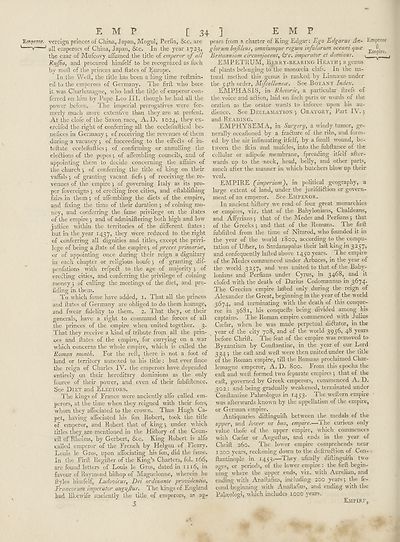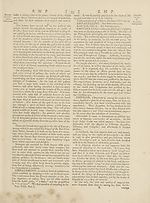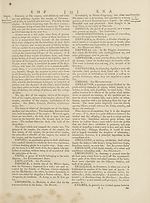Encyclopaedia Britannica, or, a Dictionary of arts, sciences, and miscellaneous literature : enlarged and improved. Illustrated with nearly six hundred engravings > Volume 8, ELE-FOR
(46) Page 34
Download files
Complete book:
Individual page:
Thumbnail gallery: Grid view | List view

E M P
Emperor, vcreign princes of China, Japan, Mogul, Perfia
’~v 1 all emperors of China, Japan, &c. In the year 1723,
the czar of Mufcovy affumed the title of emperor of all
RuJJia, and procured himfelf to be recognized as fueh
bv mod of the princes and dates of Europe.
In the Wed, the title has been a long time redrain¬
ed to the emperors of Germany. The fird who bore
it was Charlemagne, who had the title of emperor con¬
ferred on him by Pope Leo III. though he had all the
power before. The imperial prerogatives were for¬
merly much more extendve than they are at prefent.
At the clofe of the Saxon racev A. 13. 1024, they cx"
ercifed the right of conferring all the ecclefiadical be¬
nefices in Germany ; of receiving the revenues of them
during a vacancy ; of fucceeding to the e deeds of in-
tedate ecclefiadics 5 of confirming or annulling the
elections of the popes; of aflembling councils, and of
appointing them to decide concerning the affairs of
the church } of conferring the title of king on their
vaffals ; of granting vacant fiefs ; of receiving the re¬
venues of the empire 5 of governing Italy as its pro¬
per fovereigns 5 of erecting free cities, and edablifiiing
fairs in them; of affembling the diets of the empire,
and fixing the time of their duration ; of coining mo¬
ney, and conferring the fame privilege on the dates
of the empire j and of adminidering both high and low
judice within the territories of the different dates:
but in the year 1437, they wrere reduced to the right
of conferring all dignities and titles, except the privi¬
lege of being a date of the empire *, of prcces primaries,
or of appointing once during their reign a dignitary
in each chapter or religious houfe ; of granting dif-
penfations with refpeff to the age of majority j of
erefling cities, and conferring the privilege of coining
money 5 of calling the meetings of the diet, and pre~
fiding in them.
To which feme have added, 1. That all the princes
and dates of Germany are obliged to do them homage,
and fwear fidelity to them. 2. That they, or their
generals, have a right to command the forces of all
the princes of the empire when united together. 3.
That they receive a kind of tribute from all the prin¬
ces and dates of the empire, for carrying on a war
which concerns the whole empire, which is called the
Roman month. For the red, there is not a foot of
land or territory annexed to his title : but ever fince
the reign of Charles IV. the emperors have depended
entirely on their hereditary dominions as the only
fource of their power, and even of their fubfidcnce.
See Diet and Electors.
The kings of France were anciently alfo called em¬
perors, at the time when they reigned with their fons,
whom they affociated to the crown. Thus Hugh Ca¬
pet, having affociated his ion Robert, took the title
of emperor, and Robert that of king *, under which
titles they are mentioned in the Hidory of the Coun¬
cil of Rheims, by Gerbert, &c. King Robert is alfo
tailed emperor of the French by Helgau of Fleury.
Louis le Gros, upon affociating his fon, did the fame.
In the Fird Regider of the King’s Charters, fob 166,
are found letters of Louis le Gros, dated in 1116, in
favour of Raymond bifhop of Maguelonne, wherein he
dyles himfelf, Ludovicus, Dei ordinante providentia,
Trancorum unperator auguflus. The kings of England
had likewife anciently the title of emperors, as ap-
t .34 ] E M P
&e. are pears from ?- charter of King Edgar: Ego Edgarus An- Emperor
glorum baftleus, omniumque regum infularum oceani qiuc ^
Britanniam circumjacent, <b’c. imperator ct dominus. 1
EMPETRUM, Berry-bearing Heath-, a genus
of plants belonging to the monoecia clafs. In the na¬
tural method this genus is ranked by Linnaeus under
the 54th order, Mifcellanece. See Botany Index.
EMPHASIS, in Rhetoric, a particular drefs of
the voice and action, laid on fuch parts or words of the
oration as the orator wants to inforce upon his au¬
dience. See Declamation ; Oratory, Part IV. 5
and Reading.
EMPPIYSEMA, in Surgery, a windy tumor, ge¬
nerally occafioned by a fracture of the ribs, and form¬
ed by the air infinuating itfelf, by a fmall wound, be¬
tween the ikin and mufcles, into the fubdance of the
cellular or adipofe membrane, fpreading itfelf after¬
wards up to the neck, head, belly, and other parts,
much after the manner in which butchers blow up their
veal.
EMPIRE (imperium), in political geography, a
large extent of land, under the jurifdiftion or govern¬
ment of an emperor. See Emperor.
In ancient hidory wre read of four great monarchies
or empires, viz. that of the Babylonians, Chaldeans,
and Affyrians j that of the Medes and Perfians; that
of the Greeks : and that of the Romans. The fird
fubfided from the time of Nimrod, who founded it in
the year of the world 1800, according to the compu¬
tation of Uflier, to Sardanapalus their lad king in 3257,
and confequently laded above 1450 years. The empire
of the Modes commenced under Arbaces, in the year of
the world 3257, and was united to that of the Baby¬
lonians and Perfians under Cyrus, in 34^^? an(^ ^
clofed with the death of Darius Codomannus in 3674,
The Grecian empire laded only during the reign of
Alexander the Great, beginning in the year of the world
3674, and terminating with the death of this conque¬
ror in 3681, his conqueds being divided among his
captains. The Roman empire commenced with Julius
Caffar, when he was made perpetual di ft a tor, in the
year of the city 708, and of the world 3956, 48 years
before Chrid. The feat of the empire was removed to
Byzantium by Condantine, in the year of our Lord
334 ; the ead and wed were then united under the title
of the Roman empire, till the Romans proclaimed Char¬
lemagne emperor, A. D. 800. From this epocha the
ead and wed formed two feparate empires that of the
ead, governed by Greek emperors, commenced A. D.
302 : and being gradually weakened, terminated under
’Condantine Pakeologus in 1453. The wedern empire
was afterwards known by the appellation of the empire,
or German empire.
Antiquaries didinguilh between the medals of the
upper, and lower or bus, empire.—The curious only
value thofe of the upper empire, which commences
with Caffar or Augudus, and ends in the year of
Chrid 260. The lower empire comprehends near
1200 years, reckoning down to the dedruftion of Con-
dantinople in 1453.—They ufualiy didinguifh two
ages, or periods, of the lower empire : the fird begin¬
ning where the upper ends, viz. with Aurelian, and
ending with Anadafius, including 200 years 5 the fe-
cond beginning with Anadafius, and ending with the
Fajaeologi, which includes 100c years*
Empire*
Emperor, vcreign princes of China, Japan, Mogul, Perfia
’~v 1 all emperors of China, Japan, &c. In the year 1723,
the czar of Mufcovy affumed the title of emperor of all
RuJJia, and procured himfelf to be recognized as fueh
bv mod of the princes and dates of Europe.
In the Wed, the title has been a long time redrain¬
ed to the emperors of Germany. The fird who bore
it was Charlemagne, who had the title of emperor con¬
ferred on him by Pope Leo III. though he had all the
power before. The imperial prerogatives were for¬
merly much more extendve than they are at prefent.
At the clofe of the Saxon racev A. 13. 1024, they cx"
ercifed the right of conferring all the ecclefiadical be¬
nefices in Germany ; of receiving the revenues of them
during a vacancy ; of fucceeding to the e deeds of in-
tedate ecclefiadics 5 of confirming or annulling the
elections of the popes; of aflembling councils, and of
appointing them to decide concerning the affairs of
the church } of conferring the title of king on their
vaffals ; of granting vacant fiefs ; of receiving the re¬
venues of the empire 5 of governing Italy as its pro¬
per fovereigns 5 of erecting free cities, and edablifiiing
fairs in them; of affembling the diets of the empire,
and fixing the time of their duration ; of coining mo¬
ney, and conferring the fame privilege on the dates
of the empire j and of adminidering both high and low
judice within the territories of the different dates:
but in the year 1437, they wrere reduced to the right
of conferring all dignities and titles, except the privi¬
lege of being a date of the empire *, of prcces primaries,
or of appointing once during their reign a dignitary
in each chapter or religious houfe ; of granting dif-
penfations with refpeff to the age of majority j of
erefling cities, and conferring the privilege of coining
money 5 of calling the meetings of the diet, and pre~
fiding in them.
To which feme have added, 1. That all the princes
and dates of Germany are obliged to do them homage,
and fwear fidelity to them. 2. That they, or their
generals, have a right to command the forces of all
the princes of the empire when united together. 3.
That they receive a kind of tribute from all the prin¬
ces and dates of the empire, for carrying on a war
which concerns the whole empire, which is called the
Roman month. For the red, there is not a foot of
land or territory annexed to his title : but ever fince
the reign of Charles IV. the emperors have depended
entirely on their hereditary dominions as the only
fource of their power, and even of their fubfidcnce.
See Diet and Electors.
The kings of France were anciently alfo called em¬
perors, at the time when they reigned with their fons,
whom they affociated to the crown. Thus Hugh Ca¬
pet, having affociated his ion Robert, took the title
of emperor, and Robert that of king *, under which
titles they are mentioned in the Hidory of the Coun¬
cil of Rheims, by Gerbert, &c. King Robert is alfo
tailed emperor of the French by Helgau of Fleury.
Louis le Gros, upon affociating his fon, did the fame.
In the Fird Regider of the King’s Charters, fob 166,
are found letters of Louis le Gros, dated in 1116, in
favour of Raymond bifhop of Maguelonne, wherein he
dyles himfelf, Ludovicus, Dei ordinante providentia,
Trancorum unperator auguflus. The kings of England
had likewife anciently the title of emperors, as ap-
t .34 ] E M P
&e. are pears from ?- charter of King Edgar: Ego Edgarus An- Emperor
glorum baftleus, omniumque regum infularum oceani qiuc ^
Britanniam circumjacent, <b’c. imperator ct dominus. 1
EMPETRUM, Berry-bearing Heath-, a genus
of plants belonging to the monoecia clafs. In the na¬
tural method this genus is ranked by Linnaeus under
the 54th order, Mifcellanece. See Botany Index.
EMPHASIS, in Rhetoric, a particular drefs of
the voice and action, laid on fuch parts or words of the
oration as the orator wants to inforce upon his au¬
dience. See Declamation ; Oratory, Part IV. 5
and Reading.
EMPPIYSEMA, in Surgery, a windy tumor, ge¬
nerally occafioned by a fracture of the ribs, and form¬
ed by the air infinuating itfelf, by a fmall wound, be¬
tween the ikin and mufcles, into the fubdance of the
cellular or adipofe membrane, fpreading itfelf after¬
wards up to the neck, head, belly, and other parts,
much after the manner in which butchers blow up their
veal.
EMPIRE (imperium), in political geography, a
large extent of land, under the jurifdiftion or govern¬
ment of an emperor. See Emperor.
In ancient hidory wre read of four great monarchies
or empires, viz. that of the Babylonians, Chaldeans,
and Affyrians j that of the Medes and Perfians; that
of the Greeks : and that of the Romans. The fird
fubfided from the time of Nimrod, who founded it in
the year of the world 1800, according to the compu¬
tation of Uflier, to Sardanapalus their lad king in 3257,
and confequently laded above 1450 years. The empire
of the Modes commenced under Arbaces, in the year of
the world 3257, and was united to that of the Baby¬
lonians and Perfians under Cyrus, in 34^^? an(^ ^
clofed with the death of Darius Codomannus in 3674,
The Grecian empire laded only during the reign of
Alexander the Great, beginning in the year of the world
3674, and terminating with the death of this conque¬
ror in 3681, his conqueds being divided among his
captains. The Roman empire commenced with Julius
Caffar, when he was made perpetual di ft a tor, in the
year of the city 708, and of the world 3956, 48 years
before Chrid. The feat of the empire was removed to
Byzantium by Condantine, in the year of our Lord
334 ; the ead and wed were then united under the title
of the Roman empire, till the Romans proclaimed Char¬
lemagne emperor, A. D. 800. From this epocha the
ead and wed formed two feparate empires that of the
ead, governed by Greek emperors, commenced A. D.
302 : and being gradually weakened, terminated under
’Condantine Pakeologus in 1453. The wedern empire
was afterwards known by the appellation of the empire,
or German empire.
Antiquaries didinguilh between the medals of the
upper, and lower or bus, empire.—The curious only
value thofe of the upper empire, which commences
with Caffar or Augudus, and ends in the year of
Chrid 260. The lower empire comprehends near
1200 years, reckoning down to the dedruftion of Con-
dantinople in 1453.—They ufualiy didinguifh two
ages, or periods, of the lower empire : the fird begin¬
ning where the upper ends, viz. with Aurelian, and
ending with Anadafius, including 200 years 5 the fe-
cond beginning with Anadafius, and ending with the
Fajaeologi, which includes 100c years*
Empire*
Set display mode to:
![]() Universal Viewer |
Universal Viewer | ![]() Mirador |
Large image | Transcription
Mirador |
Large image | Transcription
Images and transcriptions on this page, including medium image downloads, may be used under the Creative Commons Attribution 4.0 International Licence unless otherwise stated. ![]()
| Permanent URL | https://digital.nls.uk/192264017 |
|---|
| Attribution and copyright: |
|
|---|
| Description | Ten editions of 'Encyclopaedia Britannica', issued from 1768-1903, in 231 volumes. Originally issued in 100 weekly parts (3 volumes) between 1768 and 1771 by publishers: Colin Macfarquhar and Andrew Bell (Edinburgh); editor: William Smellie: engraver: Andrew Bell. Expanded editions in the 19th century featured more volumes and contributions from leading experts in their fields. Managed and published in Edinburgh up to the 9th edition (25 volumes, from 1875-1889); the 10th edition (1902-1903) re-issued the 9th edition, with 11 supplementary volumes. |
|---|---|
| Additional NLS resources: |
|

